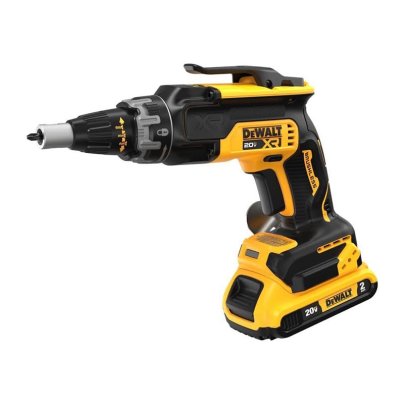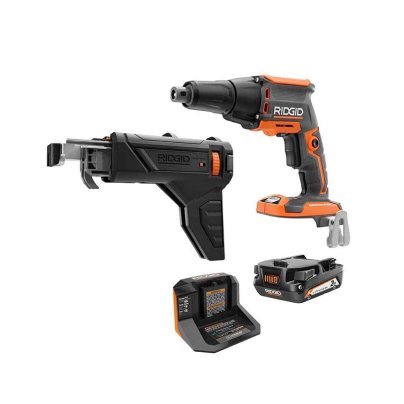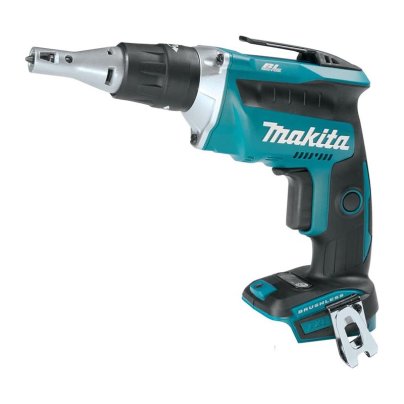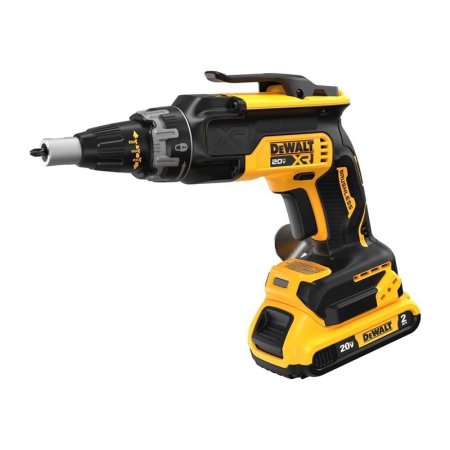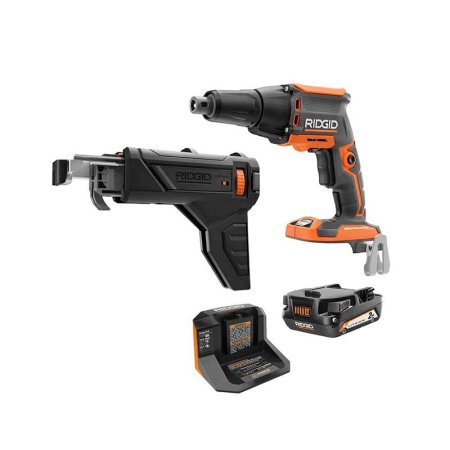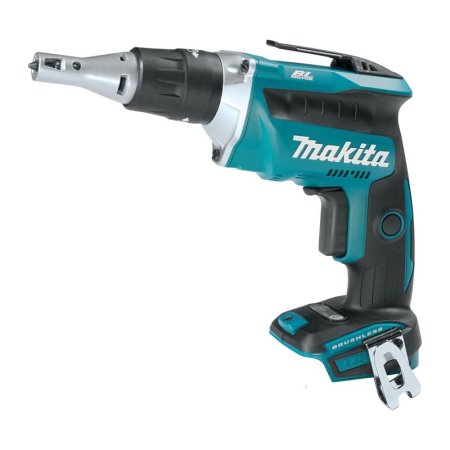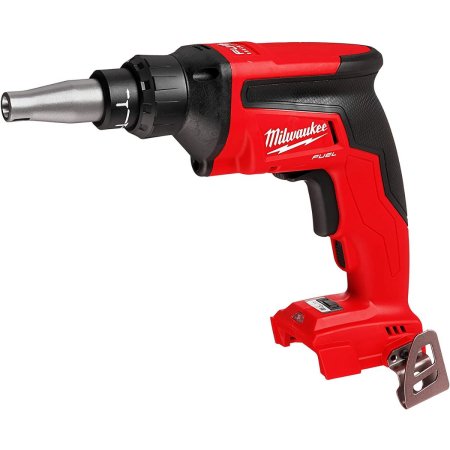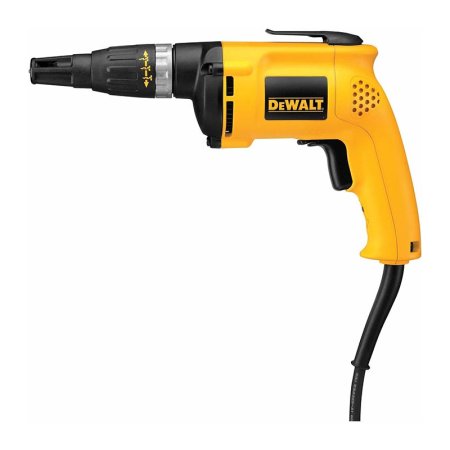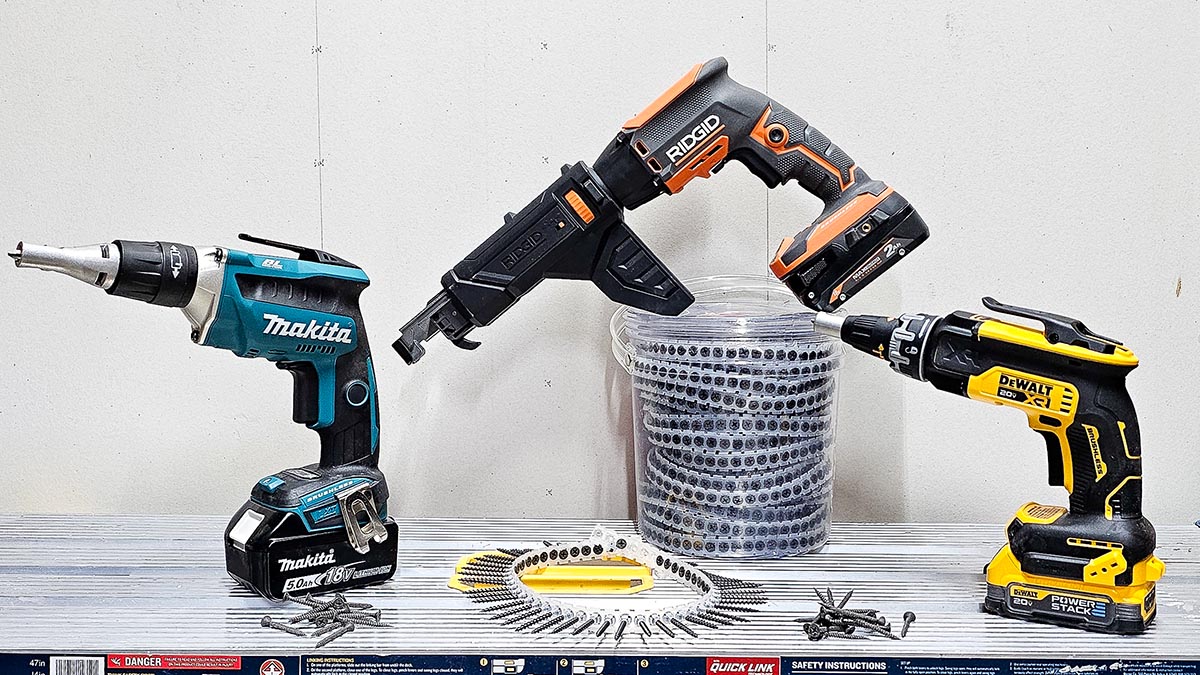
We may earn revenue from the products available on this page and participate in affiliate programs. Learn More ›
If you’re still using a drill to hang drywall, it’s time to upgrade. Drywall screw guns are faster, more powerful, and designed to prevent overdriven screws. After researching dozens of models, we chose the top three for hands-on testing. One stood out above the rest—the DeWalt 20V MAX XR Drywall Screw Gun took the top spot with a winning combination of power, precision, and ergonomic design.
Drywall screw guns are faster, more precise, and along with drywall screws, are specifically designed to prevent torn drywall paper and overdriven screws. Today’s dedicated drywall screw guns add a whole new level of efficiency to panel hanging. Ahead, find out why they work so well, and how the following models earned a spot on our lineup of the best drywall screw guns.
- BEST OVERALL: DeWalt 20V MAX XR Brushless Drywall Screw Gun Kit
↓ Jump to Review - BEST BANG FOR THE BUCK: Ridgid 18V Drywall Screwdriver Collated Attachment
↓ Jump to Review - BEST KIT: Makita 18V LXT Cordless Drywall Screwdriver Kit
↓ Jump to Review - BEST COMPACT: Milwaukee M18 FUEL Drywall Screw Gun
↓ Jump to Review - BEST CORDED: DeWalt 5300 RPM High-Speed VSR Drywall Screw Gun
↓ Jump to Review
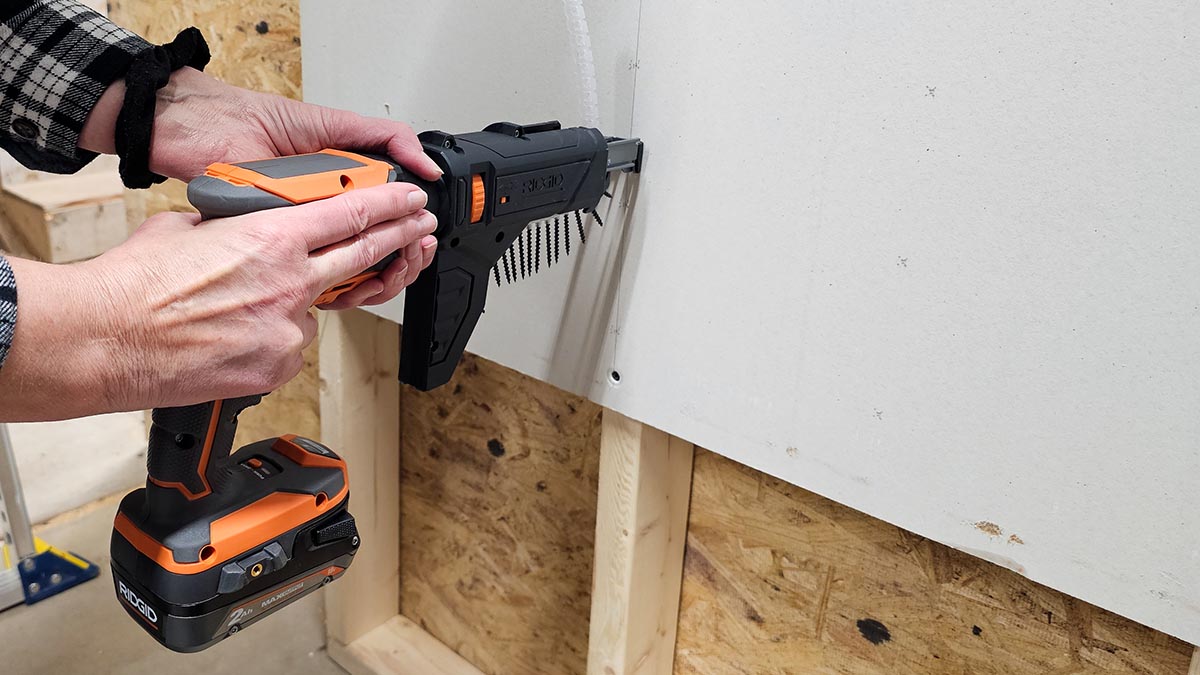

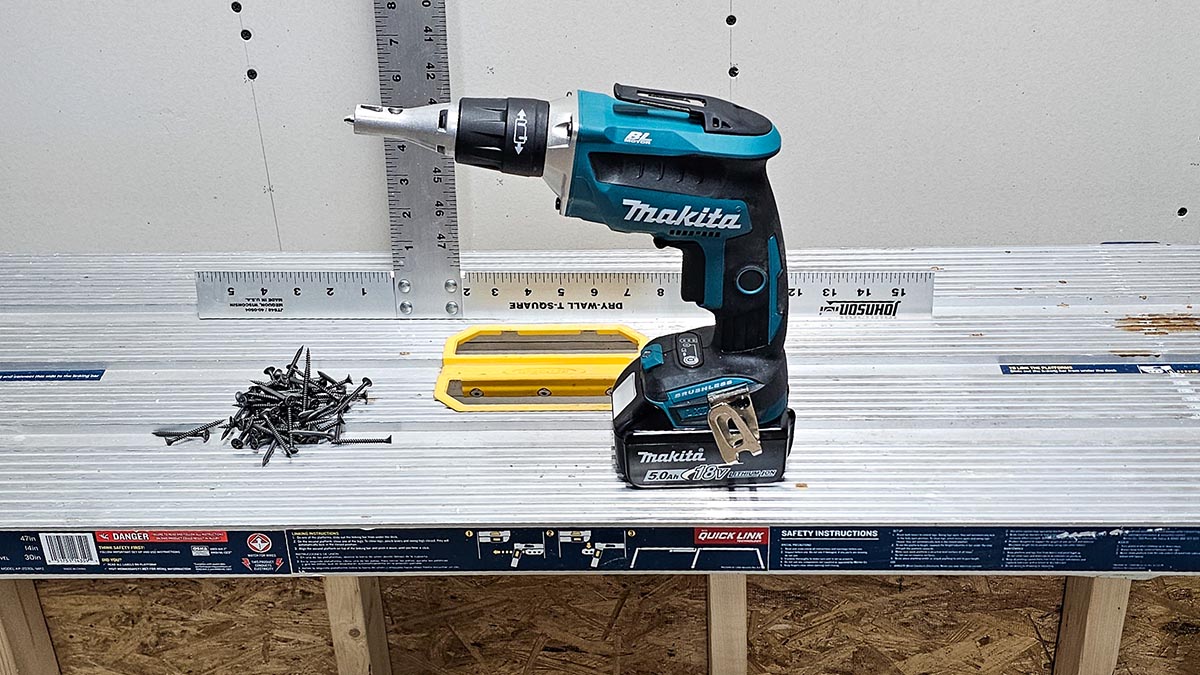
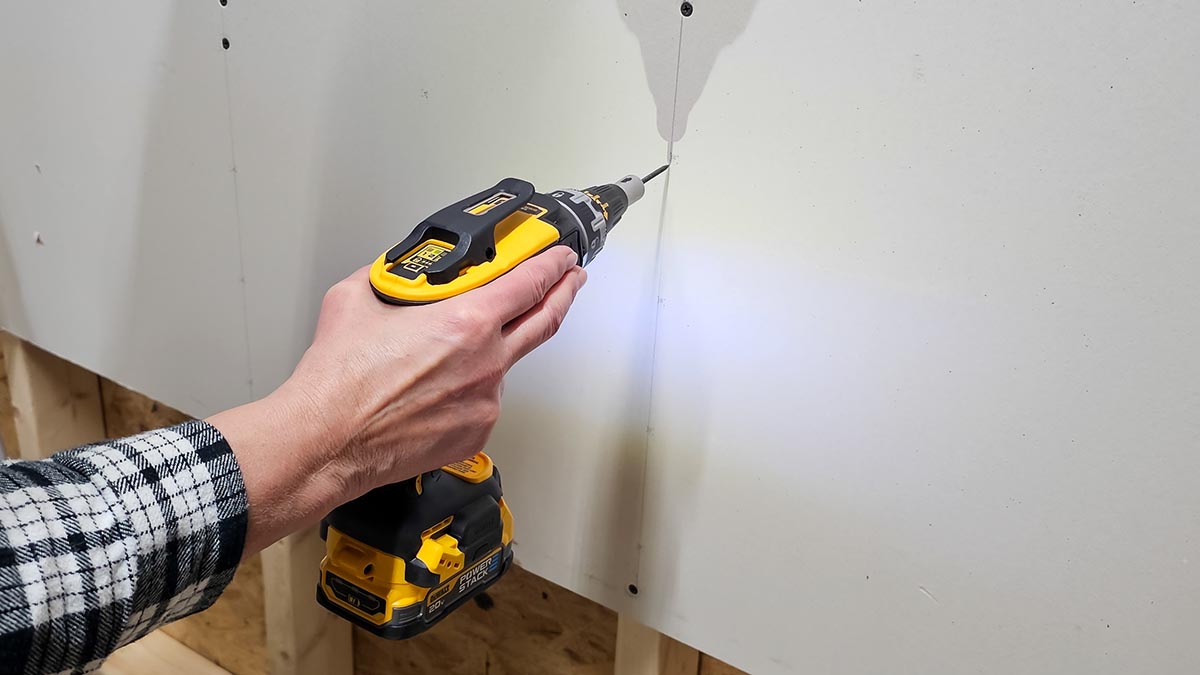
Our Top Picks
Here are the three top drywall screw guns we tested, plus two more that we think are just as good. Learn about their features as well as their best and worst points.
Best Overall
DeWalt 20V MAX XR Brushless Drywall Screw Gun Kit
What We Like
- Lightweight yet substantial
- Precise depth control
- Multiple operating modes
- Fast, efficient screw insertion
What We Don’t Like
- No collated screw attachment
Specs
- Power: Cordless battery
- Speed: 4,850 RPM
- Weight: 5.7 pounds
Our Ratings: Ease of Use 5/5; Ergonomics 5/5; Performance 5/5; Durability 5/5; Value 5/5
The DeWalt 20 MAX XR drywall screw gun demonstrated an ideal combination of power, precision, and ease of use in our tests, easily earning top honors. At 5.7 pounds, the screw gun is lightweight enough for repeated or overhead use without causing hand fatigue yet heavy enough to feel substantial in hand.
Adjusting the screw depth was simple—all we had to do was twist the nose cone to ensure the screw head was seated with the perfect dimple for taping. Screw-insertion speed is adjustable in trigger mode, and the screw gun also offers push-start mode and lock-on mode. Push-start mode allowed us to put a drywall screw on the magnetic bit, and when we pushed the screw into the drywall, the motor automatically engaged and drove it home. Professionals will like the speed of the lock-on mode that keeps the motor running but only drives the screw when the user exerts pressure.
We drove more than 100 drywall screws with the DeWalt MAX XR drywall screw gun, and after the initial depth adjustment, each one went in quickly to the correct depth. This model is great for both DIYers and pros.
What our tester says: “This is a great drywall screw gun—the DeWalt was user-friendly, and it allowed me to drive screws quickly and efficiently.” —Glenda Taylor, Product Reviews tester and writer
Get the DeWalt 20V MAX drywall screw gun at Amazon, The Home Depot, or Ace Hardware (tool only).
Best Bang for the Buck
Ridgid 18V Drywall Screwdriver Collated Attachment
What We Like
- Includes battery, charger, and collated attachment
- Fastest screw insertion
- Compatible with universal collated screws
- Consistent depth control
What We Don’t Like
- Two-handed operation with attachment on
Specs
- Power: Cordless battery
- Speed: 4,700 RPM
- Weight: 8.64 pounds
Our Ratings: Ease of Use 4.5/5; Ergonomics 5/5; Performance 4.75/5; Durability 4.5/5; Value 5/5
The Ridgid 18V drywall screw gun kit provides a lot of supplies for the money. While many models are sold “tool only,” meaning users have to purchase a battery and charger separately, the Ridgid comes with the tool, the battery, and the charger, plus a collated screw attachment—all for one price.
We were able to insert drywall screws faster with the Ridgid gun than with the other models we tested because the collated attachment fed the screws into place, one right after another, automatically. This feature saved a lot of time. We picked up a pack of universal Senco collated drywall screws, and they worked seamlessly with the Ridgid screw gun.
The only downside we found—and it’s really a matter of preference—is that we needed to use two hands to control the Ridgid. The tool comes with a second handle on the collated attachment to make it easy. The only time this might be an issue is when hanging drywall overhead, where it might be tricky to use both hands to control the tool. But at that point, just remove the attachment, and voila, it’s a standard drywall screw gun.
With and without the attachment in place, the Ridgid drywall screw gun drove the screws to the correct depth each time. Everything users need is included in the kit except the screws, which may vary by project.
What our tester says: “I love that Ridgid included a collated attachment in this kit. It made it so much easier to hang drywall panels quickly.” —Glenda Taylor, Product Reviews tester and writer
Get the Ridgid drywall screw gun at The Home Depot.
Best Kit
Makita 18V LXT Brushless Cordless Drywall Screwdriver
What We Like
- Lightweight and compact
- Charger, 4Ah battery, and case included
- PushDrive auto mode
- Long battery life
What We Don’t Like
- Required occasional depth readjustment
Specs
- Power: 18V cordless
- Speed: 4,000 RPM
- Weight: 3.8 pounds
Our Ratings: Ease of Use 4/5; Ergonomics 5/5; Performance 4.25/5; Durability 4/5; Value 4.5/5
Makita’s cordless drywall screwdriver may be a high-quality tool aimed at professional users, but it sports user-friendly features that will appeal to serious DIYers. We’re big Makita fans, and this drywall screw gun kit did not disappoint. This model was the lightest we tested, at just 3.8 pounds with the battery in place. That made it easy to install screws overhead without suffering from hand fatigue.
The kit comes with a screw gun, a 4Ah battery, a charger, and a nice hard case for protecting the tool during transport, along with a belt clip and LED work light. It doesn’t come with a collated attachment, but users can purchase one separately.
Like many drywall screw guns, the Makita has an auto mode called PushDrive that engages the motor when the user pushes the screw into the drywall. It also features a lock-on mode for the fastest insertion. We drove over 100 drywall screws into our test wall, and the only issue we ran into was having to readjust the screw depth occasionally.
The 4Ah included battery provided enough power to last through our entire test period. The company claims it will run for 50 percent longer than competitors, and it did last longer than the battery that came with the DeWalt. But that was a lower-capacity battery, so it’s not a head-to-head comparison. Overall, it’s a great little screw gun.
Get the Makita Brushless drywall screw gun at Amazon, The Home Depot, or Acme Tools.
More Great Options
We didn’t personally test the next two drywall screw guns, but they made our shortlist due to their build quality, features, and consumer reviews. If you still haven’t found the one you want, be sure to check these two out.
Best Compact
Milwaukee M18 FUEL Drywall Screw Gun
What We Like
- Excellent build quality
- Fast brushless motor
- Auto-driving mode
What We Don’t Like
- Battery and charger are extra
Specs
- Power: 18V cordless
- Speed: 4,500 RPM
- Weight: 2.5 pounds
Milwaukee has a reputation for reliable, durable tools packed with features that appeal to professionals, and we like the look of their M18 cordless drywall screw gun.
The brushless motor drives the Milwaukee at 4,500 RPM. Milwaukee claims its batteries last three times longer than competitors, though it doesn’t estimate their lifespan or make any direct comparisons. At just 9 inches long and weighing 2.5 pounds without a battery, the tool is among the most compact in its class.
Like the models we tested, the Milwaukee M18 drywall screw gun features an auto mode and can also be locked in the “on” position, but it will only drive screws when it senses contact with the drywall sheet. Place a screw on the magnetic bit, press the tip against the drywall, and the gun drives the screw to the correct depth. A collated attachment is not included, but we like that one can be ordered separately—for those looking for sheer speed, collation is a game-changer.
The nose cone gives three-position depth adjustment and can easily be removed so the gun can potentially be used to drive decking screws. An LED light and belt clip are included, but unfortunately the battery and charger are sold separately.
Get the Milwaukee drywall screw gun at Amazon, The Home Depot, or Acme Tools.
Best Corded
DeWalt 5300 RPM High-Speed VSR Drywall Screw Gun
What We Like
- High-speed driving
- Heavy-duty gearing
- Competitive price
What We Don’t Like
- Cord length may limit use
Specs
- Power: 6 amp corded
- Speed: 5,300 RPM
- Weight: 2.9 pounds
While cordless drywall screw guns are certainly convenient, we’ve run into situations where we forgot to charge a battery, and when that happens, a corded model is a lifesaver. DeWalt’s high-speed corded model has many features that make it an attractive option for those who want strong performance with minimal outlay.
The 6-amp motor produces super-fast driving of 5,300 RPM. This makes the DeWalt corded drywall screw gun ideal for use with metal studs or joists, which are popular in commercial settings but tougher to pierce than wood. The nose cone has a three-position depth adjustment. Helical gears, which mesh more easily than straight-cut alternatives, provide renowned DeWalt durability.
The tool weighs just 2.9 pounds and has good ergonomics that help counter the inconvenience of having a cord. The 8-foot cord is longer than some, but we’d suggest keeping a good extension cord around to avoid worrying about the location of an outlet while hanging drywall.
Get the DeWalt VSR drywall screw gun at Amazon, Lowe’s, or The Home Depot.
Jump to Our Top Picks
How We Chose and Tested the Best Drywall Screw Guns
| Testing Stats | |
|---|---|
| Products tested | 3 |
| Time spent testing | 3 days |
| Tests performed | 4 |
| Price range | $150 to $300 |
We thoroughly researched dozens of the latest products from the leading manufacturers of drywall screw guns. We narrowed it down to three for hands-on testing in real-life drywall hanging applications.
In testing, we used the drywall screwdrivers to insert screws through ½-inch drywall panels into standard wall studs. We did not test the guns on metal studs, which are mainly used in commercial construction. However, each of the guns we tested is designed for metal studs as well. We analyzed ergonomics and build quality and noted the power, precision, and user-friendliness of each drywall screw gun. We tested every feature and mode on the screw guns and awarded points based on a rubric.
After testing, we averaged the points to determine our best overall pick and to categorize the others for their best uses.
| Ease of Use | Ergonomics | Performance | Durability | Value | |
| DeWalt 20V | 5 | 5 | 5 | 5 | 5 |
| Ridgid 18V | 4.5 | 5 | 4.75 | 4.5 | 5 |
| Makita 18V | 4 | 5 | 4.25 | 4 | 4.5 |
What to Consider When Choosing a Drywall Screw Gun
Before drywall screw guns came along, builders used drywall dimple tips on their drills to insert drywall screws, and before that, they hung drywall using a hammer and drywall nails. When securely attaching materials to drywall, there’s no debate about whether to use nails or screws: screws hold better than nails.
While all drywall screw guns do basically the same job, several factors affect tool performance and price. Although some models are meant primarily for professionals, the DIY user has many options. Understanding the following features will help you determine which drywall screw gun will suit you best.
Corded vs. Cordless
While corded drywall screw guns are still available and often come with an attractive price tag, the majority of drywall electric screwdrivers are now cordless. The freedom of movement they offer is an advantage, particularly when working on ceilings.
Cordless drywall screw guns can have either a brush or brushless motor, and there are important differences between the two. Brush motors were developed for corded tools. They are reliable and low-cost. When cordless tools first appeared, existing brush motors were the obvious choice. The problem is that brushes cause friction and, as a result, heat, which doesn’t have much effect on a corded tool but saps energy from the battery of a cordless model.
Brushless motors produce almost zero friction, so they use the battery power more efficiently, resulting in longer runtimes. The best tools use brushless motors, but they are more expensive. As a result, some less-expensive cordless tools still have brush motors.
Battery-operated screw guns may be sold as “bare tools” (without a battery or charger). If the user doesn’t already own compatible batteries, this can add a considerable amount to the price. Pay attention to the Amp hour (Ah) rating of batteries. This can be compared to fuel: the higher the number, the longer the battery will run between charges.
Cordless screw guns are described as either 18 or 20 volt (V), but there is no actual difference. All cordless tools have a small surge at start-up, so they initially produce 20V. They then settle to 18V for normal operation. The only difference is that some manufacturers choose to use the higher figure.
Speed and Torque
Speed is a key factor with drywall screw guns. It isn’t practical to drill pilot holes when hanging drywall, so the gun has to drive the screw through the drywall and then through the wood joist or metal stud behind it in a single hit. Few ordinary drill/drivers run at over 2,000 revolutions per minute (RPM). While that’s sufficient for hanging drywall on wooden studs, it isn’t fast enough to drive the screw through metal. All of our tested picks run at 4,000 RPM or more.
Variable speed is available in some models. This doesn’t have any impact on drywall hanging when full speed is used, but it does provide versatility for other driving tasks. A reverse setting for backing out screws, usually switched by a lever close to the trigger, is another common addition.
Depth Adjustment and Clutch
An important feature of most drywall screw guns is the nose cone, which surrounds the gun’s drywall drill bit. As the screw is driven into the drywall sheet, the nose cone provides a depth stop. The screw head is sunk just below the surface so it can be hidden by filler, but not driven too deep.
The nose cones on most wallboard screw guns are used to adjust screw depth and some can be removed. This would be handy if driving decking screws, for example, where the diameter of the head is larger than drywall screws and would not fit within the cone.
A clutch often works in conjunction with the nose cone, disengaging the drive when the screw reaches the desired depth.
Weight and Ergonomics
Weight and ergonomics always have an impact on handheld power tools, but differences can be more pronounced when hanging drywall. Because this is often a one-person job, it is necessary to support the drywall sheet with one hand while using the other to operate the tool.
Weight will make a considerable difference to those who are hanging drywall all day, especially if installing ceilings. A comfortable grip and an easy-to-reach trigger will also reduce fatigue and help prevent hand cramps.
Auto start can be a big benefit. Rather than needing to press the trigger each time a drywall screw is driven, the user can lock the trigger in the “on” position, but the gun won’t operate until it senses contact between the screw and the drywall sheet. This increases working speed and can extend battery runtime because no energy is wasted.
Additional Features
The main thing that restricts working speed when hanging drywall, even with auto mode, is the need to load each drywall screw individually. The fix for this is either a collated screw attachment or a collated screw gun.
The first is a device that is attached to the front of the drywall screw gun, allowing it to feed collated screws (screws held together in a magazine with a plastic or paper strip). With no need to fit screws manually, screws can be driven much faster, but the attachment can be removed if not needed. A self-feeding drywall screw gun has a full-time magazine feed and can be more compact and lighter than a combined gun and attachment. However, these are more expensive.
LED work lights and belt hooks are modest but useful extra features on some drywall screw guns. Those who want to know more about affixing things onto drywall should check out our review of the best drywall anchors on the market.
FAQs
A standard screw gun or drill/driver is slower than a drywall screw gun and doesn’t have any depth control. Many drywall screw guns have an auto mode and operate by applying pressure to the drywall screw rather than needing to squeeze the trigger. High-end models can have collated or auto-feed screws so that drywall can be hung very quickly. For examples, check out our roundup of the best cordless screwdrivers.
The drywall screw gun is a specialized tool, focused on doing one job particularly well. Some, though by no means all, can be used for decking and subfloors.
When hanging more than one or two drywall sheets, a drywall screw gun will save a lot of time. They aren’t just faster than a standard drill/driver—they also drive screws to precisely the right depth, time after time, allowing quicker filling and finishing.
The optimal length of drywall screws depends on the thickness of the drywall.
For 0.25-inch drywall sheets, use a drywall screw 1 to 1.25 inches long.
For 0.5-inch drywall sheets, use a drywall screw 1.25 to 1.625 inches long.
For 0.625-inch drywall sheets, use a drywall screw 1.625 to 2 inches long.
Some people like to use longer screws for ceilings, but placing them closer together is more effective than increasing the length.
Replace the bit if you notice the screws are slipping or stripping or if the tips start looking rounded.
Store the screw gun in a dry place where it won’t rust and use compressed air to blow out bits of drywall dust if needed.
The screw should penetrate the stud about 1 inch for a strong, secure hold.
Meet the Tester
Glenda Taylor is a contractor, product tester, and writer focusing primarily on construction, DIY tools, and home appliances.
Additional research provided by Bob Beacham
